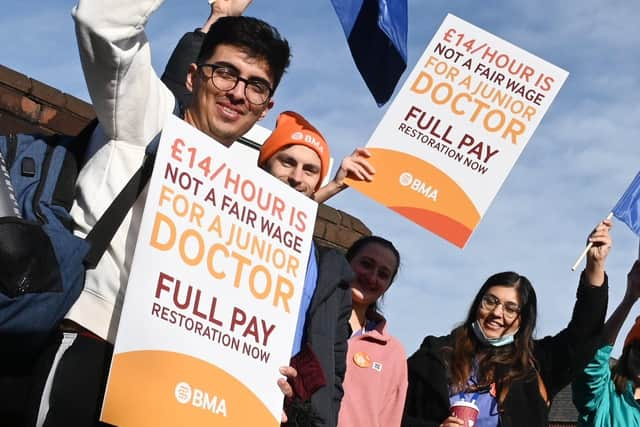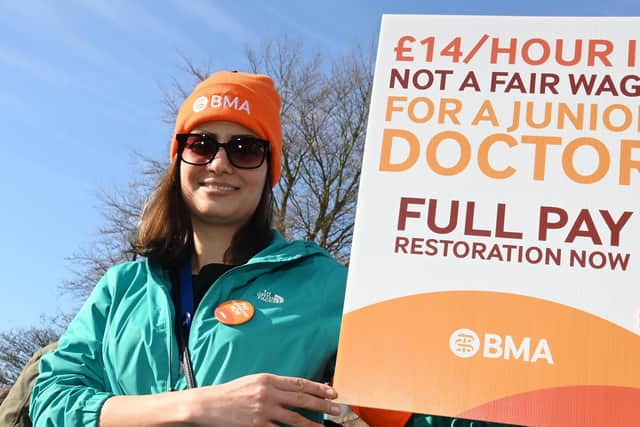Junior doctors on strike in Wigan say they 'deserve more' from the Government
and live on Freeview channel 276
The British Medical Association (BMA) is leading a 96-hour walk-out, which began on Tuesday and lasts for four days.
It is battling for pay restoration as it says junior doctors have seen significant real-terms pay cuts in recent years.
Advertisement
Hide AdAdvertisement
Hide Ad

This is the second round of strikes, as a 72-hour walk-out in March failed to bring the Government to the negotiating table to resolve the dispute.
On the opening day of the second round of strike action, we went to the picket line at Wigan Infirmary to hear from junior doctors about why they believe pay restoration is essential and their disappointment over the Government’s response to the walk-outs.
What did junior doctors at Wigan Infirmary say about the current strike action?
BMA representatives at Wigan Infirmary said the way the dispute had gone had, if anything, made junior doctors more determined to continue the battle for pay restoration.


Adam Hinchcliffe, one of the union reps, said: “It’s disappointing the Government hasn’t even had meetings with us, I think it’s quite insulting. Their tactics seem quite under-hand, I think they are trying to wait us out which is doing more damage to the NHS which is already struggling.
Advertisement
Hide AdAdvertisement
Hide Ad“It shows the Government is not willing to give from its side. It’s made a lot of people more determined to fight. People’s opinions on what we are fighting for haven’t changed and nothing has changed in our hospitals. We are not worth any less than we were before.
“The main thing we want is restoration of pay, which hasn’t reflected the increase in inflation over the past decade and doesn’t reflect the demands of the job in any way. It’s not a life-changing amount of money we are asking for and we’re also fighting for appreciation of the work we are doing.
“We are trying to halt the expectation from the Government that we will just lay back and allow our pay to be eroded along with the conditions in the hospitals.”
Adam said he sees the fight for improved pay for junior doctors as just one aspect of a broader battle to increase funding for the NHS.
Advertisement
Hide AdAdvertisement
Hide AdHe said: “The pay restoration is part of a bigger fight for the whole of healthcare which has been underfunded and for all the other healthcare workers as well. I am proud of us as a union for our willingness to fight and showing we are serious.
“There isn’t enough funding for staff and services. The Government then says hospitals are borrowing money, which makes the public think they are spending extravagantly or spending money in a way that’s not reflective of what they should be doing, when in reality they are providing a service that is a necessity for the public and that should be properly funded.
“That’s not what we are seeing from the Government at the moment and it hasn’t been the case for a long time.”
Junior doctors also spoke of the impact the current pay levels are having on those working in the NHS.
Advertisement
Hide AdAdvertisement
Hide AdAnother BMA rep Behnaz Pourmohammadi said: “We are on the picket line to have a louder voice and represent our unhappiness about the low pay we have at the moment.
“I’ve heard about colleagues who are in very stressful situations in terms of paying their bills and I am in solidarity with them. We are saying that we deserve more.
“As a doctor you feel responsible for caring for patients and when we haven’t got enough support from the Government in terms of pay, it affects our daily lives and increases our stress. It also has a bad effect on patient care which is not good for people or the NHS.
“This is not where we should be, we should be working in the hospital doing our jobs, but unfortunately we have no other option at the moment. The Government needs to listen to junior doctors.”
Advertisement
Hide AdAdvertisement
Hide AdThe junior doctors’ picket line received loud public support in Wigan on Tuesday, with motorists frequently honking their horns as they passed. Behnaz said the show of support for the doctors and the NHS was “heart-warming”.
What have the BMA and the Government said?
The BMA says junior doctors’ pay has effectively been cut by more than a quarter since 2008. It warned that the cost-of-living crisis and burnout among NHS staff is driving people away from vital roles in the health service.
The union is calling for full pay restoration to restore the decline, for a mechanism to prevent pay declining against the cost of living and inflation and for a fair and independent support system for recommending pay increases.
The BMA says this will help to turn around the current recruitment and retention issues.
Advertisement
Hide AdAdvertisement
Hide AdThe BMA also said the Government has not met with it to discuss junior doctors’ demands and it was therefore left with no choice but to ballot for industrial action.
Health and social care secretary Steve Barclay said: “It is extremely disappointing the BMA has called strike action for four consecutive days. Not only will the walkouts risk patient safety, but they have also been timed to maximise disruption after the Easter break.
“I hoped to begin formal pay negotiations with the BMA last month but its demand for a 35 per cent pay rise is unreasonable – it would result in some junior doctors receiving a pay rise of over £20,000. If the BMA is willing to move significantly from this position and cancel strikes we can resume confidential talks and find a way forward, as we have done with other unions.
“People should attend appointments unless told otherwise by the NHS, continue to call 999 in a life-threatening emergency and use NHS 111 online services for non-urgent health needs.”